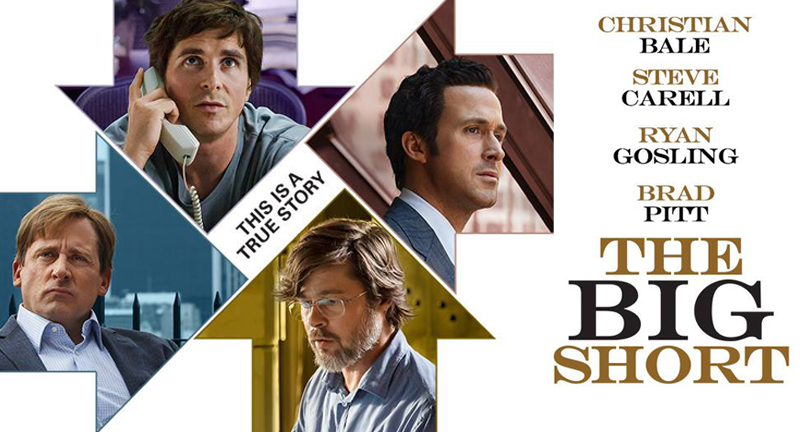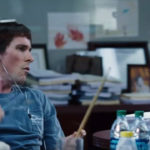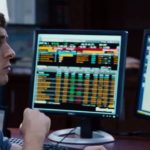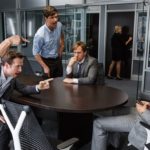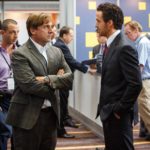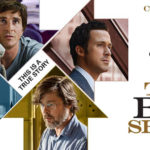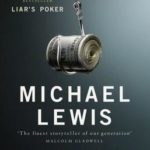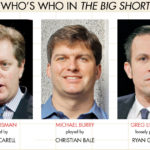Overheard at a Washington, D.C. bar: “Truth is like poetry. And most people fucking hate poetry” (in The Big Short)
On screen quotation from Haruki Murakami’s novel ‘IQ84’: “Everyone, deep in their hearts, is waiting for the end of the world to come”
“There’s none so blind as them that won’t see” – Connie Saunders, my late grandmother
Another “based on a true story” movie as documented in a book of the same name by Michael Lewis, and one that packs a punch too: The Big Short is to the global subprime banking crisis what Spotlight was to the paedophile priests scandal, as powerful as The Smartest Guys In The Room is about the Enron scandal, and as entertaining a perspective on Wall Street as The Wolf of Wall Street.
You could say it has a whimsical, almost comic turn in its desire to explain complex financial instruments in everyday terms and to mock the smug buffoons who were in such total denial about the coming crash, but there is a sad, bitter, cynical edge to the whole adventure: no matter who makes a killing and which investment banks close their doors, it is the ordinary people who end up bankrupted and losing their homes through the fraudulent financial exchanges.
Of the far-sighted visionaries who “did the math” as they say Stateside, and saw the collapse long before it occurred, first and foremost is the brilliant, eccentric and socially dysfunctional medic and hedge fund owner Dr Michael Burry (Christian Bale doing the flipside of his Patrick Bateman in American Psycho) who then takes a vast gamble using a complex instrument credit default swaps – essentially a massive bet that the housing market will collapse.
Others follow, particularly Jared Vennett (based on Greg Lippmann), Mark Baum (based on the real life Steve Eisman), Charlie Geller (based on Charlie Ledley) and Jamie Shipley (based on Jamie Mai), who gang up on the establishment banks whose unshakeable view is that the housing market is sound and cannot crash, no matter what happens with the CDOs (collatoralized debt obligations – the toxic waste of the mortgage market.)
Given that the real identifies are so readily apparent, you wonder why there was a need to fictionalise most of these characters, though the ones created by his cast make director Adam McKay‘s film larger than life and more than capable of articulating the true horrors of the real-life collapse, as depicted in a fine script co-written by McKay and Charles Randolph. Some of the devices used work well, especially using real-life celebs (eg. top chef Anthony Bourdain – the only one I had heard of!) to simplify the jargon using readily available metaphors (eg. fish!)
Essentially, the credit swaps taken by these people are to make a killing from the market and therefore not without personal financial interest, though there is much more at stake: for Burry, his investors are threatening to withdraw funds from his Scion Capital vehicle; for Baum, he discovers the level of corrupt and fraudulent activity behind the market, notably how the ratings agencies would withdraw funding and go to competitors were they not given AAA ratings and the smug satisfaction of traders who care only about what they are worth. Yes, short-term profit is what the markets care about, lining their own pockets.
Mark Baum: I don’t get it. Why are they confessing?
Danny Moses: They’re not confessing.
Porter Collins: They’re bragging.
It is these people and the supposedly brilliant but self-consciously blind senior managers who are the enemy here – and are therefore worthy of my grandmother’s quote above. Geller and Shipley gain support from brilliant but cynical ex-banker Ben Rickett (based on Ben Hockett and played by Brad Pitt), who makes them realise they are gambling on the collapse of the American economy and the livelihoods of decent folk. Bear markets and taking shorts may be one instrument for financial gain but there are a few bankers with a sense of morality, we are told – just not enough, and they are seldom believed, even if the shock waves of 2008 are still be felt to this day.
If I had to sum up this movie it would be thus: compelling; at once horrific, sad and tragic; and perhaps evidence if evidence were needed that capitalism will eat itself in the quest for a fast buck. On occasions it is a little too flash for its own good, but this is unquestionably a movie everyone should watch. The playing is uniformly credible and absorbing, the script and design perfect for the period, such that it has an authentic feel.
Tell the truth, I felt dazed when I turned off the DVD – flattened as if by an escaped steamroller, but many will feel angered by the essential facts told in the closing titles: the financial markets played fast and loose to make a quick buck, but they were the cause of the 2008 crash by lending to people who were not a good credit risk. In the USA, only one banker ended up in jail (yes, more in Europe, but not all the ones who deserved it) – but 6 million lost their homes and were effectively blamed for the crisis. Such is the power of the finance industry there and here – a sad and warped reflection on how the innocent are made to pay.
They make rational the seemingly irrational using tools designed to bamboozle the unwary and create from toxic debt an outwardly respectable fund with a glossy marketing spiel. Worse still, the closing titles suggest that the name might have changed but essentially the same toxic debt is still being hawked around with an AAA rating to this day, thanks to the lack of effective regulation of the industry. Why? Because Wall Street will tell you that any attempt to tie them up in compliance bureaucracy will stem the flow of wealth creation, and politicians are mug enough to believe that.
So much for ethics. One hopes those in power will learn and not believe the financial wizards, but I’m not holding my breath.

